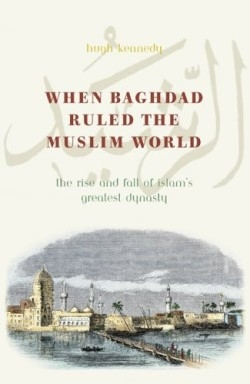When Baghdad Ruled the Muslim World
The Rise and Fall of Islam's Greatest Dynasty
Current bestsellers on Iraqi history reveal a nation steeped in religious frenzy, poverty, and war. The fact that few, if any, Western readers can conceive of a Baghdad beyond the headlines is not the fault of politicians or media, confesses the author. He places the blame with stuffy academics like himself: “For people coming from outside our specialized world, we have made our field difficult, problematic and, yes, even dull.” This book aims to change this situation.
Like many historical tales, this one begins with the stirrings of revolution. In 750 C.E., ninety years after the death of Muhammad, the reigning Islamic caliphate (the head of a Moslem community) began to weaken amid accusations of illegitimacy and corruption. The Abbasid family, long recognized as descendants of the prophet, soon defeated the unpopular Umayyads with the support of local rebels. Over the next 200 years, Arab culture reached a pinnacle of economic prosperity in an empire that stretched from Tunisia to India. Drawing on written accounts from philosophers, slaves, and government officials (literacy rates at the time were extremely high), Kennedy rescues the Abbasid legacy from the obscurity of academia in an accessible, thoroughly enjoyable read.
An alumnus of Cambridge University, Kennedy has been teaching history at the University of St. Andrews for more than thirty years. In 2000, he was elected Fellow of the Royal Society of Edinburgh and is the author of six previous books about early Muslim history, most recently Mongols, Huns and Vikings.
Despite his obvious admiration for Abbasid achievements, Kennedy does not shy away from the more sinister side of his subject. Murder, espionage, and “booze and sex” played integral roles in court culture, and as the author readily admits, they also make for good stories. At first, Kennedy seems to struggle with this anecdotal writing style, but he soon finds a comfortable rhythm, replete with moments of genuine humor and hair-raising suspense. For example, there is the inspiring, yet tragic story of the Barmakid family from Persia, whose patriarch rose from the status of slave to court vizier only to see his descendants beheaded by the paranoid caliph Harun al-Rashid in C.E. 803.
In a chapter on women, Kennedy tells the fascinating story of Islam’s only recorded female poet, Ulayya bint Mahdi, who cleverly addressed her love poems to eunuchs in order to avoid the appearance of impropriety.
At a time in history when so much depends on the future of the Middle East, readers new to the subject will delight in this thrilling account of its glorious past.
Reviewed by
Aimee Sabo
Disclosure: This article is not an endorsement, but a review. The publisher of this book provided free copies of the book to have their book reviewed by a professional reviewer. No fee was paid by the publisher for this review. Foreword Reviews only recommends books that we love. Foreword Magazine, Inc. is disclosing this in accordance with the Federal Trade Commission’s 16 CFR, Part 255.

